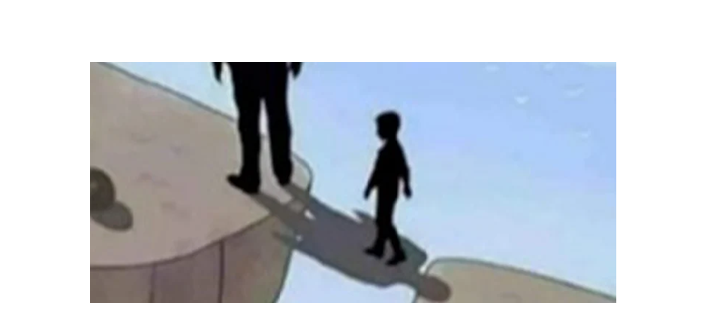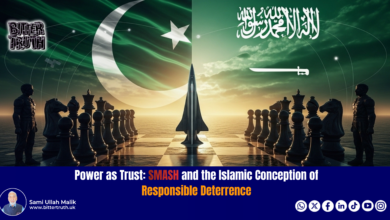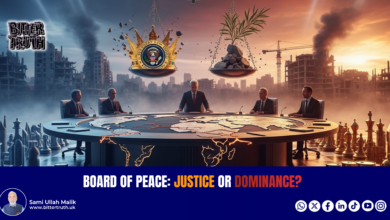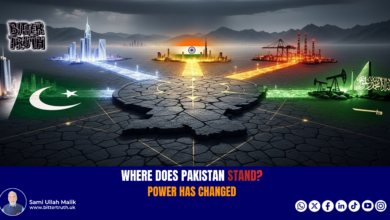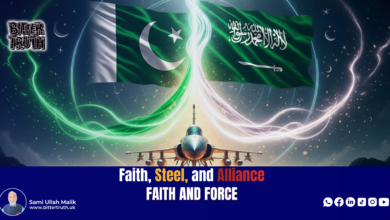My benefactor and my destination…My Father
My universe of life became dark without you.
You have written a lot on “Mother, and Motherhood ” but what is the reason why you have not written so much on a compassionate entity like “Father” what is the silent love of a father? This is the question, the answer to which, of course, even the whole book cannot do justice to even one moment of father’s love. At the mention of father’s name, a weak and feeble luminous face appears in front of the eyes, but for me the importance and personality of father is very different because when I was only thirteen years old, he left this world and went to his Lord. What, how and why the father is so important, perhaps no one has been able to know or understand more than me, because the children on whom the blessed shadow of the father still rests, they cannot understand the pain of their father’s separation, but I claim that even the “father” will not have an idea of how much mercy, compassion and selfless support his guardianship is for the children, which is irreplaceable in this world. But my father himself was orphaned at the age of nine, so his love for his children was very noble.
A father tirelessly works day and night for the sustenance of his family, without caring for his own comfort and health. His fatigue vanishes just thinking that he is securing a bright future for his children. He feels it is essential to fulfill all his children’s desires because he himself has experienced the suffocation of unfulfilled wishes and his own father’s constraints during his childhood. This is why, day and night, he remains anxious about his children’s future and livelihood, and he builds beautiful and splendid dreams with open eyes. Yet, he possesses such remarkable self-control that he never reveals his worries or frustrations at home. He endures every hardship on his own and stands like a solid wall for his family.
Since I was very close to my father, this question holds great significance for me. However, this embodiment of love departed to the presence of Allah in his youth, leaving me to dive into the ocean of childhood memories. In every difficult moment, after God, my father is my refuge because his advice and beautiful, instructive stories are still vividly remembered.
As for a mother’s love, it has been written about since humans first learned to write. But a father is such an entity that perhaps even fathers have never openly written about their love. And how could they, when every shade of a father’s love is unique and different? A mother’s love remains constant from a child’s birth to their old age, consistently overlooking all the child’s faults and loving them unconditionally. In childhood, if a child eats dirt, the mother covers it up and protects the child from the father. In adolescence, when the child’s exam results come, the mother hides the report card from the father and protects the child. In adulthood, when the child comes home late, the mother conceals it from the father and protects the child. As the child grows and their “crimes” increase, the mother continues to extend the veil of protection. In contrast, a father is a figure who, despite his immense love for his children, disciplines them only to prevent them from causing themselves greater harm. He is strict about their studies to ensure they do not become dependent on others due to a lack of education. He is concerned about their late nights to prevent them from falling into bad habits that could ruin their health and future.
A father is a mountain of affection, love, and sacrifice, a peak that no one has ever reached. His anger is temporary; even if he gets upset with us, deep down, he waits to be reconciled. Outwardly, he may appear stern, but inwardly, he is very gentle. It is only his “pride and dignity,” instilled by our society, that prevent him from expressing his affection openly. However, as soon as a child acknowledges their mistake and seeks forgiveness, the father doesn’t wait for the sentence to be completed before he rushes to embrace them with such warmth that it melts away all his feigned anger and envelops the child’s mistakes and remorse in boundless love.
From the birth of a child until the grave, the centre of a father’s life remains his child and their future. While a mother’s love is evident through her eyes and actions, a father’s treasure of love remains hidden behind seven veils. Anger, restrictions, scolding, punishment, and strictness—these are the veils that conceal a father’s love. Even if his children misunderstand him, he maintains these veils because they are the very means by which his children begin to climb the ladder of success.
I studied at an excellent school, and I used to get frustrated every day because of it. My friends arrived in luxuries cars, while I entered the school after getting off a (Tanga) horse-drawn carriage, holding a lunchbox filled with homemade parathas. My friends enjoyed colourful samosas and other snacks at the canteen. Some of them even vacationed abroad every year. One friend’s father was a doctor, another’s a politician, someone was the son of a factory owner, and another was the child of a high-ranking government official. In contrast, my father was completely uneducated and ran a small, humble hotel.
One day, overwhelmed by the society’s discriminatory behaviour, I burst out in frustration and asked my father, “Dad, why aren’t you rich like everyone else?” He looked at me for a moment and then silently patted my head, not saying a word. I desperately wanted an answer that would ease my troubled mind. But the pain I saw in his teary eyes pierced my heart like a dagger and stayed with me. Even today, when I remember those eyes, I feel ashamed of my question, but I hide behind the innocence of my childhood just as my father had hidden his tears that day.
One day, I told my grandson, “Don’t repeat my mistake. Don’t tell the person who worked tirelessly for you every day, regardless of the weather, about the forecast. They ran for you in all conditions, never caring about the cold, heat, rain, or storm. The earnings from their hard work are you. Never ask them what they earned.”
There were big shops in the city, filled with clothes, toys, and books, enticing every onlooker. I didn’t know my father’s financial situation at the time, but I always felt that if I asked for something, he would definitely get it for me. I had seen him wearing the same two sets of clothes for years, only buying a new suit when the old one was completely worn out. But whenever I asked for clothes, toys, or books, I got them immediately. Some stories are etched in my heart and soul. I’ll never forget how my father sacrificed his own needs to buy our happiness.
I’m not afraid of any challenge, trial, or disaster. I know that if even a tiny thorn pricks my foot, or if the world turns against me, it won’t matter because my father would pray endlessly for my success. As long as his loving, hardworking hand was over my head, nothing could harm me. I faced the world’s calamities with his support and eagerly awaited to share my triumphs with him.
What’s this? There’s a small issue. My father, whom I thought was stern but always agreed with my mother without a word, who secretly slipped five rupees into my pocket when I asked for one, whose shoes had visible holes but still bought me expensive shoes and sandals, and who beamed with joy at my happiness. He was straightforward but carried the blame for spoiling me his entire life. And yes, I am spoiled now. No big car, fashionable outfit, or expensive mobile phone will win my heart. My love belongs only to my father; no one else will suffice.
“Baba” is a simple word consisting of just four letters. It doesn’t have the drama of “father,” the depth of “Baba Ji,” the sweetness of “Abba ji,” or the sense of protection sometimes found in “Baba Jani.” Yet, there is something about this simple word that changes my inner weather the moment I hear it. I become a different person. On the days I remember that I was my father’s pride, every word I write becomes filled with joy and testifies to its beauty.
The time we had, Dad,
Wasn’t nearly enough
To pack in an entire
Lifetime of love.
There are so many questions
That I need answers to,
But now that you’re gone
There’s no way to ask you.
But there are still photos
To remember you by,
Each time I look at them,
I still want to cry.
They say grief is easier
to bear as time goes by,
But the doesn’t stop me
from wondering why?
Why my dear, sweet dad
Was taken so soon,
When he was my guiding star,
My sun and my moon.
There are no answers
To a question like this,
So I’ll cherish your memory,
And mourn the years we’ll miss.
I was very young when my “Baba” brought me a toy car and a shiny paper crown. I wore that crown for days, walking around like a prince, receiving admiring glances from my friends and walking with a puffed-up chest. Days, months, and years passed quickly, and I grew out of all those toys, immersing myself in studies and other activities. I was probably in the ninth grade, around thirteen years old, when I asked for a gift as usual after achieving good marks in my exams. Somehow, he found that same old toy car and shiny paper crown and included them with my new gift, filling me with the realization that a “Baba” who could preserve every moment of his children’s childhood so well could also guarantee their entire life’s safety with his selfless prayers.
The next day, “Baba” was looking at me intently, and I felt through his gaze that he saw yesterday’s shiny paper crown becoming a reality on my head. Who knows what prayers he made in his heart that today, thanks to those prayers, I am enjoying every luxury in the world. I have come to believe that I don’t need a king to crown me; the golden paper crown in my Baba’s prayers is enough. But “Baba Jani,” I need you now more than ever because, despite all these luxuries, I am indebted to you. I couldn’t even repay the few coins you gave me to give to a beggar, nor could I return the mosque donations you always entrusted me with. This regret doesn’t leave me because you departed for Allah’s presence when I was still very young!
You walked ahead, always.
You walked in strength and kindness.
You walked in love that shone with warmth.
Now I walk alone, but I feel you with me.
I heard that the owner of the world’s largest palace is the Sultan of Brunei. When I got the chance to visit Brunei, my host suddenly told me that in two minutes, we would be passing by the “Istana Nurul Iman,” listed in the Guinness Book of World Records as the largest palace in the world, spanning 2 million square feet. The dome of this palace is adorned with 22-carat gold. It has 1,788 rooms, an air-conditioned stable for the Sultan’s polo ponies, gold door handles, and 257 bathrooms. It is open to the public only for three days at the end of Ramadan when the Sultan holds an “Open House” for welcoming guests.
I also heard about a wealthy Arab ruler who owns a car made of gold. There are now dozens of individuals whose wealth estimates have reached trillions of dollars. Some of these people have so much wealth that banks don’t have enough space to store it, and they have to find other means to secure their riches. Yet, believe me, my father still tops the list of the world’s richest. Who else could be more magnificent than my Baba, who, with his tattered kurta pocket, assured me that whatever I asked for, I would receive? Tell me, who could be wealthier than this?
My father had a very commanding presence, but he never beat any children. He seemed extremely strict on the surface, but this was the discipline necessary for proper upbringing. We siblings faced many restrictions. Every child probably feels that their father is the most stringent and cruel father in the world, one who doesn’t allow late nights with friends and doesn’t give enough pocket money for frivolous activities. While my other siblings might not have faced such severe restrictions, I, despite being loved immensely, never had my unreasonable demands fulfilled. My father believed that the eldest son is like the engine of a train, with the other siblings being the carriages attached to it. Today, when I see my childhood friends trapped in vices and bad habits, I thank Allah SWT endlessly that our father was strict with us, enabling us to avoid such pitfalls and allowing us to stand with our heads held high, making our parents proud.
Do you know that fathers continue to “die” while they are still breathing? As children gain more control and the father’s authority diminishes, the father begins to “die.” When a child becomes a strong young adult, sometimes the father refrains from raising his hand out of fear that his son might respond back, a scenario too painful for him to endure. When children start making decisions on their own and inform the father only after making those decisions, the old man remains alive, but the “father” within him starts to die. A father is alive as long as his right over his children is maintained, the children for whom he endured great pains and disciplined despite his heart breaking. A mother’s love is like drinking water when thirsty, but a father’s love is like exhausting oneself so much that the thirst itself dies.
The truth is that a father’s control over his child’s life must always remain intact. Therefore, at every stage of life, children need to reassure their father, making him feel that they haven’t grown too old or important for him. Make it a habit to ask your father for money for every need, even if it’s your own earned money. If you anticipate being late from an event, start pleading with your father half an hour before, assuring him you will return soon. Notice how even today, when crossing a road, the old father holds the hand of his strong and capable child, whose children might even be married, while all children, though smiling inside, should hold his hand and cross the road, ignoring the glances of those around them.
A father’s love asks for nothing but to keep the “father” within him alive, even if he is bedridden and extremely weak. If the “father” inside him is alive, he needs nothing else in life. If your father is alive, please keep the “father” in him alive. This is his right over you and your duty towards him.
Surely, we all hope for paradise. What are we waiting for? The mother, under whose feet paradise lies, and the father, who is considered the gate to paradise—both need to be kept content. We know how crucial the gate is for entry. The command of my Lord that if a father is displeased, my Lord turns away from him, emphasizes the need to keep both parents pleased. Show them the same mercy they showed you when you were just a piece of flesh. Those who still have their parents or even one of them are truly blessed. May God forbid that it becomes too late. Their prayers always prioritize their children, often forgetting to ask for themselves.
My Prophet (PBUH) said that prayer is the essence of worship. Therefore, we should pray abundantly to our Lord. My Lord says, “I am as My servant thinks I am,” so always approach Him with hope and positivity.
“Prayer” is a “hope.”
“Prayer” is a “certainty.”
“Prayer” is a “trust.”
“Prayer” is a “means.”
“Prayer” is a “courage.”
“Prayer” is a “love.”
And my Father is the centre of all my prayers.
My prayer is: O Generous and Merciful Lord! Forgive those whose parents have passed away and grant the ability to serve those whose parents are alive. Only You listen to and accept our prayers. May you always remain happy, healthy, and never in need of anyone. Ameen.
Baba, after you left, I realized why my Allah SWT called you the gate to Paradise. A father is like a spotless mirror that never gets any dust on it, and in this mirror, no one looks more beautiful than his children.
I know you can hear me
way up in heaven
because we talk
through our hearts.
Dear Daddy in heaven
I miss you every day
and I know you miss me too.
No matter how old I get
or how long you’re gone,
I hear you, Daddy,
up in heaven
through the love
in my heart.
My universe of life became dark without you.
Sunday 16 June 24 2024

